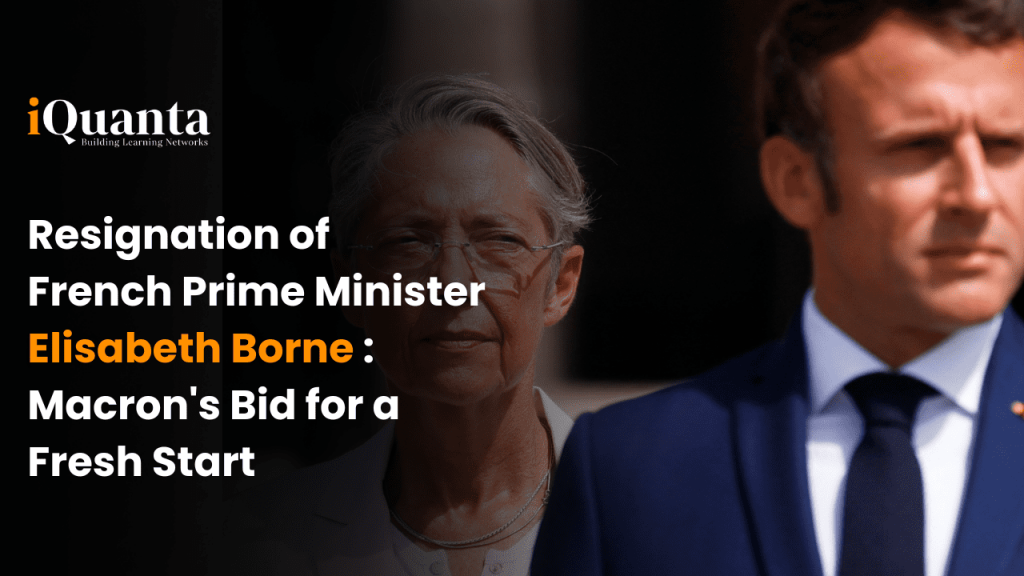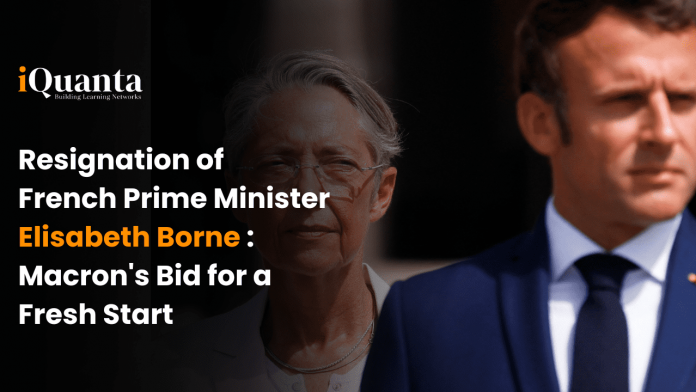
Genre : Politics
The resignation of French Prime Minister Elisabeth Borne on Monday represents a major turning point in President Emmanuel Macron’s attempts to resurrect his second term. This action takes place in the midst of a growing public unrest, political crises, and contentious reforms and upcoming elections for the European Parliament. This article explores Borne’s resignation reasons, possible successors, and wider ramifications for Macron’s government.

Political Turmoil and Contested Reforms
Borne’s resignation comes after a turbulent year filled with political unrest brought on by controversial reforms, especially those pertaining to immigration and the pension system. Deep divisions have tarnished the French political landscape, posing difficulties for Macron’s centrist majority. Splits within Macron’s coalition were brought to light by the parliament’s recent adoption of stricter immigration laws.
European Parliament Elections and Public Discontent:
Borne’s resignation was announced five months before the elections to the European Parliament, which emphasizes how urgent Macron is to reorganize his administration. In light of the general public’s dissatisfaction with growing living expenses and the perceived inability to effectively restrict immigration, Eurosceptics are predicted to make substantial gains. There is increasing pressure on Macron, the president of France, to address these issues as opinion polls currently show his party lagging behind far-right leader Marine Le Pen.
Potential Successors and Youthful Leadership
Although Macron has not announced a replacement as of yet, rumours about possible choices are rampant. Among those mentioned are thirty-year-olds Sebastien Lecornu, the minister of defence, and Gabriel Attal, the minister of education. Either would become the youngest prime minister in French history if appointed. Former minister of agriculture Julien Denormandie and finance minister Bruno Le Maire are two other possible candidates.
Political Shift or New Priorities?
The prime minister’s resignation may indicate a desire to move past the divisive immigration and pension reforms rather than a change in political philosophy. Macron wants to put new priorities at the forefront, like reaching full employment. The shuffle is a calculated attempt by Macron to move past the difficulties of the previous year and address urgent political concerns while regaining political traction.
Borne’s Legacy and Challenges Faced
Since May 2022, 62-year-old career bureaucrat Elisabeth Borne has held the position of prime minister. During her tenure, as the second woman to occupy this role, she had to navigate a turbulent parliament and pass important legislation without an absolute majority. The administration faced opposition, most notably brought on by a contentious move to raise the pension age to 64, which exposed the challenges associated with carrying out reforms.
Macron’s Economic Achievements and Future Reforms
Macron’s advisors claim that in the first year and a half of his second mandate, the administration successfully implemented major portions of the economic manifesto, despite facing challenges in a divided parliament. It is anticipated that future reforms will center on euthanasia and education and will be more collaborative. Even though it was controversial, Macron’s choice to raise the pension age through executive authority shows his dedication to enacting difficult changes.
Impact on the Presidential Succession Race
The competition within Macron’s camp for the 2027 presidential election is probably going to get more intense in light of Borne’s resignation. Among the possible contenders vying to succeed Macron are Finance Minister Bruno Le Maire, Interior Minister Gerard Darmanin, and Former Prime Minister Edouard Philippe. The reorganization denotes a calculated attempt to place important individuals in positions of future French leadership.
A turning point in Emmanuel Macron’s presidency has been reached with Prime Minister Elisabeth Borne’s resignation, which has given him a chance to reframe his government’s agenda and respond to public concerns. The forthcoming elections for the European Parliament and the Paris Olympics are among the wider ramifications Macron must deal with as he works through the difficulties of choosing a successor and assembling a new cabinet. It remains to be seen if the leadership change signals a real shift in political priorities or if it is merely a calculated move to win back public confidence, but it surely heralds a pivotal moment in French politics.




